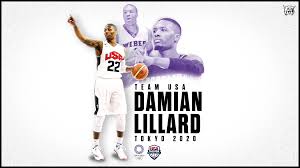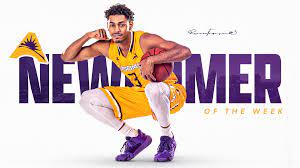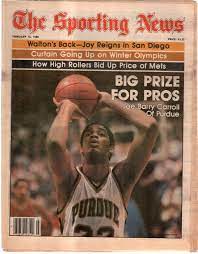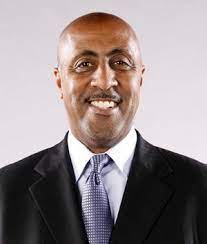The NBA Finals date back to 1947 (when they were known as the Basketball Association of America Finals) and the very 1st NCAA tourney was held in 1939. Olympic basketball competition is even older: it debuted as a demonstration event in 1904 and the men’s version became a medal sport in 1936, with the women finally getting their chance to go for the gold in 1976. The United States has dominated Olympic basketball competition from the start: the men have won 15 gold medals in the 18 tournaments they have participated in during the past 85 years, while the women have won 8 gold medals in the 10 tournaments in which they have competed during the past 45 years. After a year-long postponement due to the pandemic the 2020 Olympic basketball tournament is finally underway in Tokyo. HoopsHD’s Jon Teitel continues his coverage by chatting with sportswriter Kerry Eggers about Damian Lillard being a great scorer and trying to win a gold medal this summer. You can follow Kerry’s work at kerryeggers.com. His eighth book, “Overcoming the Odds: Jerome Kersey’s path from Clarksville, Va., to the NBA,” is scheduled for release on September 15. You can sign up for pre-sales of the book at kerryeggers.com or jeromekersey.net.
Lillard was an All-American/2-time Big Sky POY at Weber State: how did he end up there? He changed high schools during his time in Oakland so got a bit of a late start before having a good senior year. He has always been an underdog and wore that badge on his chest.
In the summer of 2012 he was drafted 6th overall by Portland and was unanimously voted NBA ROY: what did it mean to him to get drafted, and how was he able to come in and contribute right from the start? He always set incremental goals for himself. I am sure that he was happy to be picked in the lottery and it was a perfect situation for him to join a young team.
He became the first rookie to lead the NBA in total minutes played (3,167) since Elvin Hayes in 1969: were people concerned that he might get burned out too soon? Coach Terry Stotts never felt that his young guys would get burned out. Portland has not used “load management” with any of their players but I do not think it was damaging to him.
In Game 6 of the 2014 Western Conference 1st round he made a 3-PT shot as time expired to clinch a 1-PT win over Houston, give the Trail Blazers their 1st playoff series win since 2000, and become the 1st player since John Stockton in 1997 to make a buzzer-beater to win a playoff series: did you think the shot was going in (www.youtube.com/watch?v=mejFtEY5faU), and how did that shot change his life (if at all)? I did not think it was going in but I was not going to put it past him given his propensity for making shots when it counted the most. It was the first big “Logo Lillard” shot of his career and exemplified what a clutch player he is.
Take me through the 2019 playoffs:
In Game 5 of the Western Conference 1st round he scored 50 PTS and made a franchise-record 10 3PM including a series-clinching 37-footer at the buzzer in a 3-PT win over Oklahoma City (www.youtube.com/watch?v=HMm5NtXLVDY), becoming the only player besides Michael Jordan to make 2 series-winning FGs during his career: where does he rank among the most clutch players that you have ever seen? He is willing to take those shots, which many players are not. He has missed a few of them but he is on the short list of Portland players who I would want to have the ball in his hands.
In Game 3 of the Western Conference Semifinals he had 28 PTS in 57 minutes in a 3-PT 4-OT win over Denver: what are your memories of the 2nd game in NBA playoff history to go into quadruple-overtime? I remember that team being relentless/persistent. Denver was arguably the better team but Portland was determined to win that game. He will not admit it but it was personal with Russell Westbrook.
In Game 2 of the Western Conference Finals he separated his ribs but continued to play through the pain for the rest of the 4-game series sweep by Golden State: do you think the outcome vs. the 2-time-defending champs would have been any different if he had been healthy? They might have won 1-2 games but I do not know if they would have won the series. He struggled but Golden State was fantastic.
In January of 2020 he scored a career-high 61 PTS in a 5-PT OT win over Golden State Warriors, which started a 6-game stretch in which he averaged 48.8 PPG including his 1st career triple-double: was it just 1 of those scenarios where every shot he put up all month long seemed to go in because he was “in the zone”? Yes. Through that period he had a 12-game run during which he averaged 40.3 PPG and 9.2 APG while shooting 52.6% from the field, 49.3% from 3-point range, and 88.2% from the free-throw line. The only player in NBA history to approach those stats over that long of a span was James Harden, and he was not close to Dame’s numbers in terms of shooting accuracy.
When the NBA suspended its season in March of 2020 due to the coronavirus he was averaging a career-high 28.9 PPG/7.8 APG: how is he getting better as he gets older? He has added depth to his 3-point shot. The 35-footer is no longer that unusual; it is within his range. He has a great first step and I think he is better than ever at getting to the basket and finishing. He also has gotten even better at drawing three free throws while getting fouled off a pick-and-roll from behind the 3-point line.
His 2051 career 3PM is #10 all-time and his 89.3 career FT% is #7 all-time: what makes him such a great shooter? Consistency, work ethic, and a great belief in himself. He seems to have nerves of steel. No situation rattles him and no moment is too big for him. I would take him at the foul line with my life in his hands!
He is a hip-hop artist/rapper who goes by the name “Dame D.O.L.L.A.”, has his own record label called Front Page Music, and won the 2019 J. Walter Kennedy Citizenship Award: what is he like off of the court? He also twice won the Magic Johnson Award, given annually to the player who combines excellence on the basketball court with cooperation in dealing with the media and public. He is a professional in that regard. He understands what the media needs, is great to interview, and is one of the best I have ever seen in the way he deals with the public.
He is 1 of 2 players in Trail Blazers history (along with Clyde Drexler) to become a 5-time All-Star: do you think he will eventually pass Drexler as the best Blazer ever, and do you think he will eventually join Drexler in the Hall of Fame? Dame has not passed Clyde yet but it is not out of the realm of possibility. Dame is 31 and is hitting his peak physical years as a player. If he is able to sustain his level of performance, I do think he will become a Hall of Fame someday.












